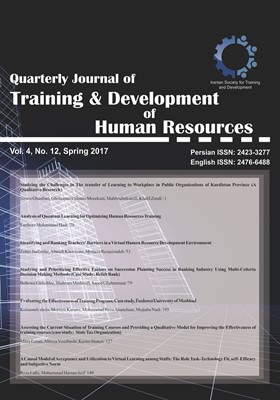-
-
List of Articles
-
Open Access Article
1 - Representing the Obstacles and Challenges in Growth and Empowerment of Newly-hired Faculty Members: A Phenomenological study
Majaid Ghasemi Keyvan Salehi -
Open Access Article
2 - A Pathology and Effectiveness of the Transfer of Training to Workplace
Gholamreza Shams Morkani Hamed Abbasi kasani -
Open Access Article
3 - Designing Bodies of Knowledge to Develop Expert Training Evaluators for Iranian Ministry of Petroleum
Saeid Safaee Movahed Hosein Falahinia -
Open Access Article
4 - Determining the Management Development Dimensions in Supplying Automotive Parts Company (SAPCO)
Mahshid Firouz Abadi Marjan Fayazi Mehrdad Estiri -
Open Access Article
5 - Analysis of the Impact of Intellectual Capital on Organizational Performance with the Mediating Role of Knowledge Management in Iranian Oil Terminals Company
Elham Nowrouzi cheshmeh ali SeyedAligholi Rowshan Milad Vafadar -
Open Access Article
6 - Studying the Levels of Training Outsourcing from the Perspective of Training Experts in Governmental Departments of the Southern Khorasan
Yazdanpanah Behrouz Hossein Momenimahmouei -
Open Access Article
7 - Educational Need Assessment and Investigating the Needed Skills of Independent Auditors, Financial Managers and Financial Analysts in Iran Based on Katz Model
Saber Sheri Anaghiz Nezam Aldin Rahimeian Jamshid Salehi Sadaghiyani Abotaleb Khorasani
-
The rights to this website are owned by the Raimag Press Management System.
Copyright © 2017-2026







